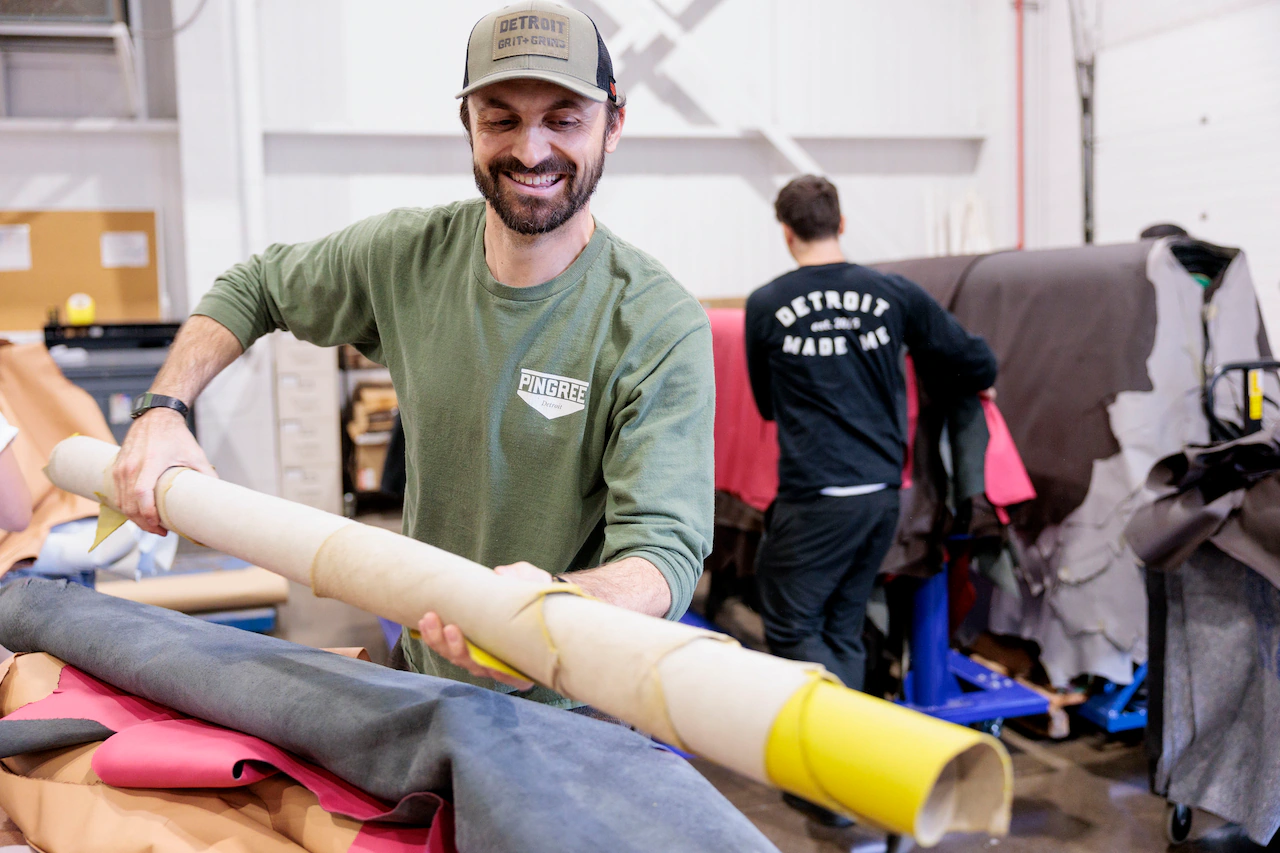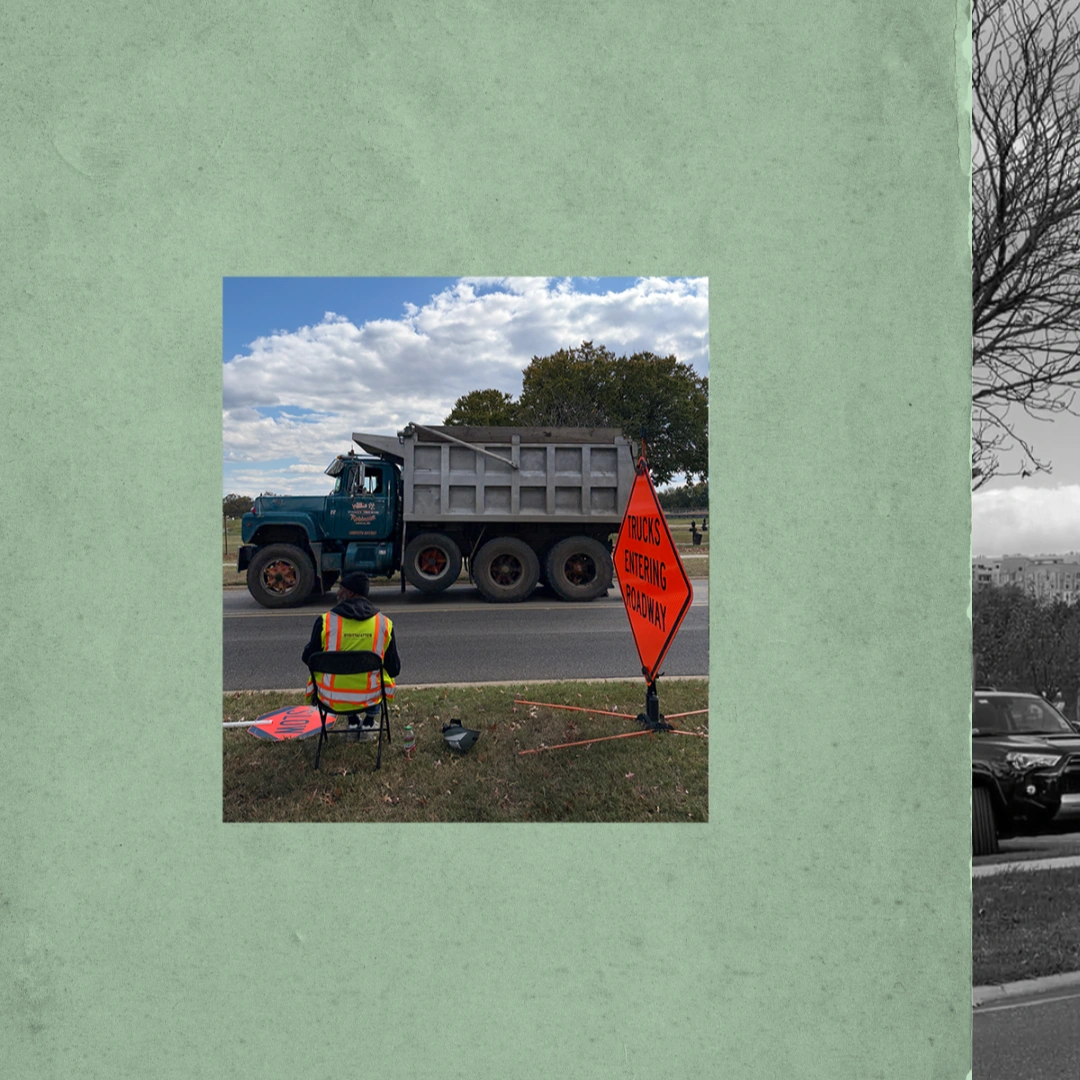Copyright M Live Michigan

DETROIT, MI -- The workshop smells old, expensive and comforting. What was an old tire shop is now lined with rolls of leather ranging from rich mahogany to vibrant yellows. If you get close enough to one of these thick rolls of cow hide, you might say it smells like a new car – and that’s because it nearly was. Pingree Detroit is making its own Motor City legacy by standing on the shoulders of Detroiters before them. Pingree crafts bags, shoes and wallets from leather leftovers intended for a steering wheel at the helm of a Bronco or the front seat of a Jeep. Automakers discard this leather due to minor imperfections or discontinued product lines. Since its founding in 2015, Pingree has kept 55,000 pounds of leather out of the landfill and given it new life as streetwear. The hands behind the craftsmanship are local Detroiters and veterans — a natural fit for a company focused on service-driven work, said Jarret Schlaff, co-founder and CEO of Pingree Detroit. “We’re looking for the best leaders to join our team and folks who are really committed to mission and service above self. [Veterans are] some of the best leaders on the planet,” he said. This Veterans Day, Pingree will open its first brick-and-mortar store in downtown Detroit’s entertainment epicenter at 22 W. Columbia Street, just steps from Fox Theatre, Comerica Park, Ford Field and Little Caesars Arena. Auto scraps to sustainable fashion Named after the late 19th century Detroit mayor and Michigan governor Hazen Pingree, the business upholds his legacy as a Civil War veteran who created job opportunities for soldiers when they came home. The company prides itself on being worker owned. Inspired by Pingree’s progressive policies, Schlaff founded the company on wealth sharing and distributes 77% of profits back to the workers. Its new flagship space will serve as both showroom and classroom — a visible workshop where customers can get to know the makers on days like Footwear Fridays and see products like handcrafted sneakers come to life. Pingree offers free employee training which ranges from learning how to make shoes with a hammer and nails to the detailed work of stitch sowing. Each product comes with a Maker ID card giving the customer a backstory on the worker who made it. “We always meet folks who are looking for opportunity and so we thought that this would be a beautiful place to start,” Schlaff said. ”There’s a lot of really deserving men and women who are looking for opportunity that we can then support, make a part of our leadership team and co-own the company with us.” Ten years ago, Schlaff and the early members of the team were making deals at junk yards. They’d sift through broken down vehicles looking for useable steering wheel leather, dashboard vinyl, and seat belts and pile it all in the back of Schlaff’s Ford F-150. Now, materials are finding them. This fall Pingree received their largest leather donation to date from Pangea, a luxury automotive leather supplier. Bob Tuuk, Vice President of Global Purchasing at Pangea, was looking for a company focused on “servant labor” and sustainability. There’s no way Tuuk would have these premium hides from around the world slowly disintegrate in a landfill or ship and resell them to Mexico. As a veteran himself, Tuuk said he was drawn to Pingree’s mission of local jobs for veterans and Detroiters. A month before the downtown store opening, the Pingree team parked a 20-foot U-Haul outside of Pangea in Rochester Hills. The warehouse had years’ worth of discarded leather that no longer had a purpose. Cowhides in black, blue, brown and red were stacked high in piles. Manufacturers turned them down for aesthetic reasons ranging from the wrong shade to blemishes like fly bites and rub marks from the animals. For Eric Rranxburgaj, Pingree co-owner, it was a warehouse full of untapped potential. Although he’s the company’s youngest worker-owner at 22, his coworkers rave that Rranxburgaj has an eye for design and steady hands for creation. At the Detroit shop, Rranxburgaj takes on many roles from finishing specialist to facilities manager. “Whenever I see leather I have a vision of what it could be,” Rranxburgaj said rolling up a deep navy hide. “This could be purses, totes, journals.” Unrolling 600 hides by hand, employees spent two hours inspecting, sorting and stacking piles of unprocessed leather. The treasure pieces were in Pangea’s “scrap pile” of leather that had been tumbled for nearly 20 years, making them buttery smooth to the touch. The truckload of leather will become more than 3,500 leather goods sold in Pingree’s new Detroit store, online and at its Rustbelt Market and Eastern Market vendor booths. Every product is one of one, which makes seeing a customer light up when they’ve found just the right item extra satisfying, said Brandon Kulow, Pingree dye cutting specialist and Navy veteran. “When you’re in [the service] everything feels like it has a meaning, a purpose. You don’t do anything by accident,” he said. “In the civilian world that’s not always there. That’s one of the draws for me to be here. We don’t necessarily make essential things, but we make things that have a very cool purpose and meaning in people’s lives.” Legacy of service When Nathaniel Crawford II left the U.S. Air Force he was looking to be part of a team again. He jokes that it was the TBS cartoon “Captain Planet and the Planeteers” who inspired him to find work with a positive impact for the planet. After serving in Afghanistan and South Korea, sustainable fashion became his new superhero job. “This is exactly what I was aiming to do, something in the community,” he said. “I’m an 80s baby so when I heard they were recycling and upcycling, I was like, ‘people are doing this? Why haven’t we all been doing this?’” Now co-owner and vice president of footwear operations, Crawford has inherited both a major role – Pingree prides itself on custom footwear – and a major legacy. It was shoemaking that brought Hazen Pingree to Detroit after serving in the Union Army. Pingree and Charles Smith started the Pingree and Smith shoe company in 1866. By the 1890s, the company was the largest shoe manufacturer in the Midwest, according to the Detroit Historical Society. The shoe company’s name is a direct nod to Pingree’s literal boots-on-the-ground service as an activist, politician and businessman, Schlaff said. Before officially naming the company, Schlaff reached out to Pingree’s relatives and got the blessing from his great granddaughter. Hazen Pingree was a four-time elected mayor of Detroit and two-term Governor of Michigan during the Progressive Era. His legacy also extends to a municipal electric plant and community-led gardens during an economic downturn. “He embodies this idea of service above self,” Schlaff said. “He was one of the most impactful mayors in U.S. history. I could spend hours talking about him.” The company even named their clutch and crossbody bag Adeline, in honor of Hazen’s mother who convinced him to go into public service. An old magazine advertisement, “Pingree Shoe Talk” sits framed on Schlaff’s desk in the makeshift office, separated from the workshop by just a wall and some shelving units. Pinned to the walls are sketch ideas, magazine clippings and Detroit Pistons memorabilia. Hanging above are plain sheets of brown paper. Written in marker in capital letters are two simple pledges: a mission and a purpose.



